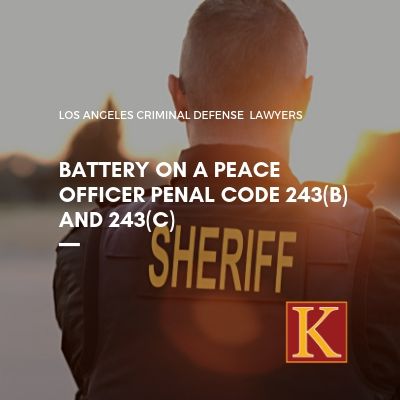California Penal Code Sections 243(b) and 243(c) makes it is illegal to commit a battery on a peace officer. Person can be found guilty of PC 243(b) or (c) if he knowingly used unlawful force against a peace officer while he was performing his duties.
Elements of Penal Code 243(b) Battery on a Peace Officer
Prosecutor must establish the following elements to prove that the defendant is guilty of battery on a police officer.
- Defendant unlawfully and willfully touched a peace officer in an offensive or harmful manner
- The victim was a peace officer and was performing his duties
- Defendant knew or reasonably should have known, that the victim was a peace officer who was performing his duties
- If charged for PC 243(c) – as a result of the used force used the peace officer suffered injury that required medical treatment
For Purposes of The Penal Code A Peace Officer Includes
Penal Code gives a broad definition to a “peace officer”, which includes the following:
- Police officers
- Firefighters
- Life guards and search and rescue
- EMTs or ER doctors and nurses
- Animal control
- Traffic cops
- Service processors
Penal Code Section 243(b) and (c) is only applicable when the peace officer whom the defendant battered was engaged in the performance of his duties.
Violent or Offensive Manner
Even the slightest touching, if it is done in an objectively rude or violent manner constitutes offensive touching even if it didn’t cause harm, pain, or any kind of injury. The touching doesn’t need to be direct.
Legal defenses to Penal Code Sections 243(b) and 242(c)
Legal defenses to California Penal Code Section 243(b) and 243(c) include
- Defendant committed the battery in self-defense or in defense of another person
In case the defendant reasonably believed that he or another person was in imminent danger of great bodily injury or harm and he reasonably used force necessary to deflect that harm, then he can assert self-defense.
- Defendant acted accidentally
For being convicted of a 243(b) or (c) defendant must have intentionally touched the peace officer. In case he didn’t act willfully he cannot be found guilty of battery on a peace officer.
- The peace officer was not performing his duties
In case the peace officer whom the defendant battered was not engaged in the performance of his duties, then he cannot be found guilty of this crime. Even if the victim announced that he was a peace officer and was wearing a police uniform he cannot be deemed performing his duties in case he unlawfully detained or arrested the defendant, violated defendant’s fourth amendment rights or committed police brutality. This means that officer was not engaged in a legal performance of his duties.
Penalties for a California PC 243(b) or 243(c) Conviction
Penalties for violating California PC 243(b) and 243(c) Sections
In California a basic battery on a peace officer is a misdemeanor with the following penalties:
- Up one year in a county jail,
- A fine of up to $2,000
- Misdemeanor probation
California PC Section 243(c): Wobbler
According to California PC Section 243(c), a battery on a peace officer that caused an injury is a wobbler and can be charged as either a misdemeanor or a felony, depending on the circumstances of the case and the defendant’s criminal history. For purposes of California PC Section 243(c) the injury is considered the one that requires medical attention.
Penalties for a misdemeanor conviction are the following:
- Up one year in a county jail
- A fine of up to $10,000
- Misdemeanor probation
Penalties for a felony conviction are the following:
- Sixteen months, two or three years in a county jail under California realignment
- A fine of up to $10,000
- Felony probation

